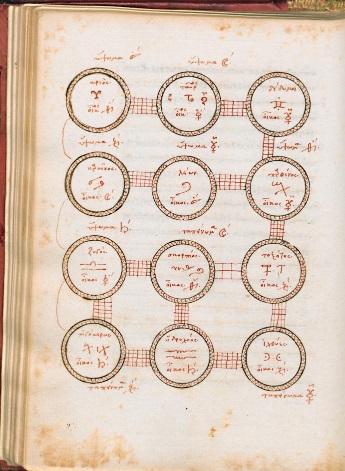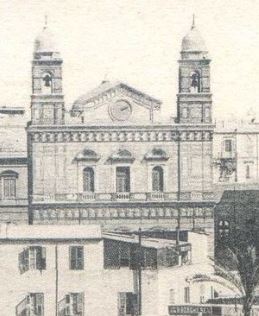

Home News & Events Study Research Members & Staff Publications Friends of the Hellenic Institute Contact Us
The Porphyrogenitus Project
Introduction
The Porphyrogenitus Project, conceived by the Late Julian Chrysostomides and Dr Charalambos Dendrinos, involves the compilation of a Lexicon of Abbreviations & Ligatures in Greek Minuscule Hands (ca. 8th century to ca. 1600). Greek Palæography has never had its Cappelli (Dizionario di Abbreviature latine ed italiane), making it difficult and often impossible for classicists and mediævalists to have access to the content of manuscripts. The aim of this project is to make good this deficiency by incorporating as full a number of abbreviations and ligatures as possible, so that it becomes a useful aid to students and scholars.
The material comes from manuscripts housed in major libraries in Europe and the United States, and covers a variety of subjects from literature, music, law and notarial documents to mathematics, physics & alchemy, astronomy & astrology, weights & measures, and medicine among others, as well as tachygraphy, cryptography, monocondyliae and abbreviations and ligatures in early printed books.
Methods
The symbols are scanned on a Hewlett-Packard ScanJet IIC, edited, and converted to outline Postscript form. They are then incorporated as graphic elements into an otherwise TeX document on a Viglen IV/33 running Eberhard Mattes' emTeX, converted to Postscript using ArborText's DVILASER/PS, and finally printed on HP Postscript printer.
The present method adopted breaks fresh grounds in the reproduction of these abbreviations and ligatures. While in the past these signs were reproduced by hand (either by the scholar himself, or one assumes by a craftsman) with varying degrees of success, we are now able to reproduce these symbols directly from facsimiles of manuscripts. The reproduction of these abbreviations and ligatures, therefore, not only gives an exact representation, but it also highlights the stylistic idiosyncrasies of scribes and scriptoria.
The results will be published as a handbook similar to Cappelli's Dizionario. Steps are taken into producing a CD-ROM in appropriate format.The material will be displayed in four columns, and will follow a strict alphabetical order, based on the first column, which will contain the reproduction of the abbreviated word; the second column will give the transcription of the letters contained in the abbreviated word; the third will contain the complete word, while the fourth column will give the manuscript date, or provenance in case of rare or unique abbreviations. In the case of ligatures the third column will be omitted, while the reproductions of symbols will be followed only by the third and fourth columns.
Funding
The project, begun in May 1992, is now completed and is prepared for publication. The initial stage became possible thanks to the support of the History Department of Royal Holloway, which provided us with the necessary equipment in order to proceed with the research and computerized compilation of the Lexicon. A Leverhulme Emeritus Readership Award and a British Academy Research Grant towards its progress were granted for the academic years 1995-96 and 1997-1998 respectively. The project was funded by the Arts and Humanities Research Board between 2001-2004.
Research Team
The Porphyrogenitus project is a work born out of co-operation, each of the participants contributing their own speciality and enthusiasm. This co-operation not only created a spirit of fellowship, but opened new ways that might not have been envisaged before by each one of us separately. Dr P.E. Easterling, Regius Professor at Cambridge University, is preparing the Introduction; the Late Julian Chrysostomides and Dr Charalambos Dendrinos were involved with the research; Mr John Chrysostomides deals with computer applications; Mr Philip Taylor of Royal Holloway Computer Centre, devised the computer program which enabled us to put into practice this project, and advises us on varied technical matters such as TeX programming, computer networking and preparation of printed and electronic documents.
We should be grateful to scholars for contributions that might enable us to achieve our aim, and to enable us to revise the list periodically with additional material.
For further information please contact Dr Charalambos Dendrinos, Director, The Hellenic Institute.

